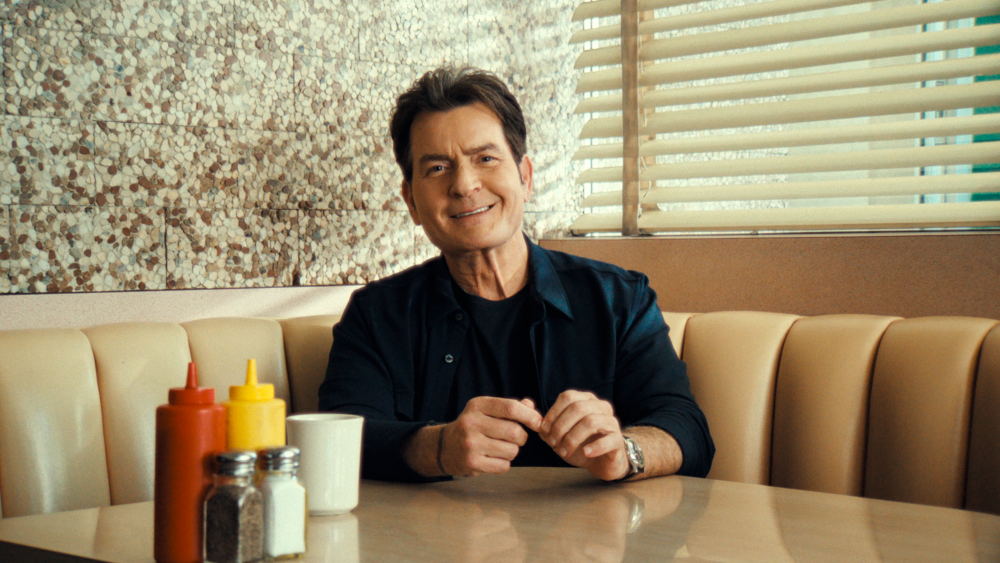SPOILER ALERT: This article discusses in detail the docuseries “aka Charlie Sheen,” now streaming on Netflix.
The biggest revelation in “aka Charlie Sheen,” a two-part documentary movie centered on the titular star, is never articulated by Sheen himself. Instead, the wunderkind-turned-sitcom-star, now eight years into hard-won sobriety, talks around the disclosure, using a tortured metaphor about restaurant menus to discuss his sexual appetites at the height of his addiction. It’s left to his offscreen interlocutor, director Andrew Renzi (“Paul American”), to explicitly state what Sheen won’t: that the actor has had sex with men, an admission that quite evidently carries more weight for Sheen himself than it does for the viewer. (Or at least this viewer, anyway.)
The exchange is indicative of this odd, frustrating, occasionally intriguing project, which pads out scarce but real nuggets of insight with leading questions and endless clips. So is the fact that Sheen helpfully lays out a neat, three-part structure for his life story — “Partying,” “Partying with Problems” and then just “Problems” — only for Renzi and his team to instead break “aka Charlie Sheen” into two 90-minute chunks. A feature film could offer more focus and concision; an extended series could be more methodical in its portraiture, rather than skipping over chapters like Sheen’s FX series “Anger Management,” getting killed off and replaced on “Two and a Half Men” or his reconciliation with co-creator Chuck Lorre. Instead, “aka Charlie Sheen” is stuck in between.
The most prominent voice in “aka Charlie Sheen” is, of course, Sheen himself, clearly calmed down from the peak mania on display in his infamous 2011 interview with Andrea Canning of ABC News but still retaining some irrepressible eccentricity. (His interviews are staged in an empty diner, because Sheen has a fondness for greasy spoons.) Sheen is joined by ex-wives Denise Richards and Brooke Mueller, with whom he shares two children each; his childhood friend Sean Penn, who grew up with the Sheen kids in Malibu; his brother Ramon Estevez; Lorre; and even Hollywood Madam Heidi Fleiss, against whom Sheen testified when a travelers’ check identified him as one of her clients.
The clear standout of this group is Sheen’s “Two and a Half Men” co-star Jon Cryer, who offers a convincing and holistic assessment of the psychology driving Sheen’s dysfunction. (Penn, smoking a cigarette in his own living room, contributes some thoughts on fame and drugs that are evocatively phrased, but too general to make much of an impression.) “I don’t know that he believes that he deserves what he’s got,” Cryer says of Sheen’s famous father Martin and early success after a breakout cameo in “Ferris Bueller’s Day Off” — so he fell into a cycle of throwing it all away, then re-earning his place in the spotlight. Cryer is similarly observant toward Sheen’s extended public meltdown, an early inflection point in the social media era in which onlookers got an exhilarating blow-by-blow of one man’s downward spiral.
But even Cryer can’t make as much of an impact in his active participation as the elder Sheen and Charlie’s brother Emilio make in their absence. (An intertitle notes both Martin and Estevez declined to participate.) We get a fascinating recap of the Sheen children’s visit to the notoriously beleaguered set of “Apocalypse Now,” but not Martin’s response to the idea that watching his father driven to the point of substance abuse and madness may have had a lasting effect on Charlie. Instead, “aka Charlie Sheen” uses Martin and Charlie’s shared scenes over the years as a flimsy substitute for the real thing, plus a bizarrely long summary of the time the pair played basketball with Michael Jordan on a forgotten celebrity game show.
“aka Charlie Sheen” saves its newsiest nuggets for the very end, when Renzi clears the room and allows Sheen to share his perspective on his HIV diagnosis; sexual assault allegations regarding the late Corey Haim, made by Haim’s contemporary Corey Feldman — and his sexual experimentation. This climactic framing defers to Sheen’s own perception of what’s most important about his life, while Renzi’s own interest seems to lie in salacious details like Sheen’s first experience with crack cocaine (he was receiving oral sex at the time) and the time he shoved an ice cube up his own rectum to get through a scene while intoxicated (helpfully illustrated with an overlaid arrow). Other turning points, like Sheen’s final commitment to sobriety, are simply glossed over. “aka Charlie Sheen” purports to go beyond Sheen’s worst, most publicized moments, but it mostly reveals how much the actor continues to live in their shadow.
Both episodes of “aka Charlie Sheen” are now streaming on Netflix.

